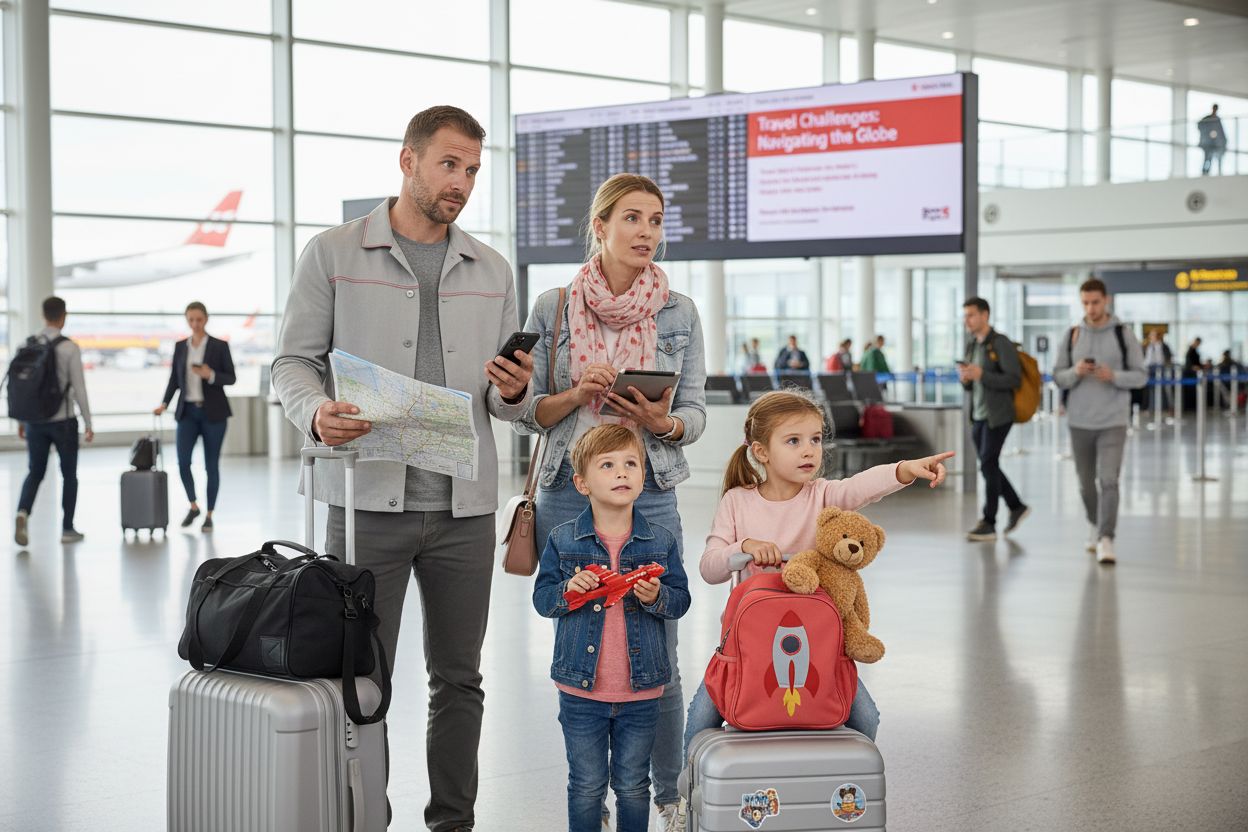Family travel has redefined what it means to take a vacation together. While most trips focus on relaxation or escaping the daily routine, these journeys can actually be life changing. Research shows that children who travel regularly develop greater emotional intelligence and adaptability compared to those who do not. You might expect the main draw to be fun destinations but the real magic happens in the bonds and memories that last for generations.
Table of Contents
- Defining Family Travel: What It Is And Who It’s For
- The Importance Of Family Travel: Building Bonds And Memories
- Exploring Different Forms Of Family Travel: Options And Preferences
- Navigating Challenges In Family Travel: Considerations And Solutions
- The Impact Of Family Travel: Benefits Beyond The Trip
Quick Summary
| Takeaway | Explanation |
|---|---|
| Family travel enhances bonds and memories. | Traveling together creates shared experiences that foster emotional connections and strengthen family relationships. |
| Diverse family structures participate in travel. | Family travel includes nuclear families, single parents, and blended families, all seeking to create meaningful experiences together. |
| Flexibility is crucial for successful family travel. | Adapting plans and accommodating different needs promotes a harmonious travel experience for all family members. |
| Travel provides critical developmental benefits. | Frequent travel enhances children’s adaptability, cultural awareness, and social skills, which support their growth. |
| *Planning helps navigate travel challenges. | Strategic preparation and open communication can alleviate logistical issues and improve the overall family travel experience. |
Defining Family Travel: What It Is and Who It’s For
Family travel represents more than just a vacation. It is a dynamic and transformative experience that brings families closer together, creating lasting memories and shared adventures across different destinations. At its core, family travel is about exploring the world collectively, embracing new experiences, and strengthening familial bonds through shared discoveries.
Understanding the Essence of Family Travel
Family travel encompasses journeys taken by parents, children, and sometimes extended family members, where the primary goal is collective exploration and enjoyment. Unlike solo or adult-focused trips, these adventures prioritize activities and destinations that cater to multiple age groups and interests. Learn more about navigating family travel challenges can help families prepare for successful trips.
The definition of family travel has evolved significantly in recent years. Modern families are no longer confined to traditional vacation models but are seeking more diverse and immersive experiences. These can range from weekend road trips to international expeditions, each offering unique opportunities for learning, connection, and personal growth.
Who Participates in Family Travel
Family travel is not limited to a specific demographic or family structure. It includes:
- Nuclear families with young children
- Multigenerational groups including grandparents
- Single-parent households
- Blended families
- Families with adopted children
- Families with children of varying ages
What unites these different family configurations is the shared desire to create meaningful experiences, learn together, and step outside their daily routines. The motivations might vary from educational enrichment to cultural exposure, adventure seeking, or simply spending quality time together away from the usual environment.
Successful family travel requires flexibility, open communication, and a willingness to compromise. Each family member brings unique preferences and energy levels, making every journey a complex but potentially rewarding collaborative experience.
The Importance of Family Travel: Building Bonds and Memories
Family travel transcends typical vacations by offering profound psychological and emotional benefits that strengthen familial relationships. These shared experiences create a unique environment for connection, learning, and personal growth that cannot be replicated in everyday home settings.
Psychological Benefits of Traveling Together
Discover strategies for meaningful family trips that maximize connection and enjoyment. According to research from the National Institutes of Health, family travel provides critical opportunities for developing emotional intelligence and interpersonal skills. Traveling together challenges family members to communicate, problem solve, and adapt to new environments collaboratively.
Families that travel regularly experience enhanced communication patterns. Removed from routine pressures, parents and children interact more authentically, sharing experiences that build mutual understanding. These interactions create shared narratives that become foundational memories, strengthening family identity and resilience.
Long Term Impact of Family Adventures
The benefits of family travel extend far beyond immediate enjoyment. Children who travel frequently demonstrate several significant developmental advantages:
- Increased cultural awareness and global perspective
- Enhanced adaptability and problem solving skills
- Improved social communication abilities
- Greater empathy and understanding of diverse experiences
- Expanded educational knowledge through real world learning
Traveling together also provides parents unique opportunities to model flexibility, curiosity, and positive stress management. Children observe and internalize these behaviors, developing crucial life skills through direct experience rather than abstract instruction.
Moreover, family travel creates intergenerational connections that preserve family history and traditions. Grandparents sharing travel stories, parents navigating new experiences together, and children forming lifelong memories all contribute to a rich, interconnected family tapestry that transcends geographical boundaries.
Exploring Different Forms of Family Travel: Options and Preferences
Family travel is a dynamic landscape with diverse experiences tailored to different family structures, interests, and budgets. Understanding the various travel formats helps families select adventures that align with their unique needs and preferences.
Types of Family Travel Experiences
Check out family vacation planning tips for US travelers to help design your perfect trip. According to research on travel preferences, family travel experiences can be categorized into several distinct formats that cater to different comfort levels and interests.

These travel styles range from structured, all-inclusive resort vacations to more spontaneous and immersive exploration modes. Each approach offers unique opportunities for family bonding, learning, and creating memorable experiences.
Popular Family Travel Formats
Families can choose from multiple travel styles that suit their preferences and comfort levels:
- All-Inclusive Resort Vacations: Predictable, comfortable experiences with organized activities
- Road Trips: Flexible, adventurous journeys with opportunities for spontaneous exploration
- Cultural Immersion Trips: Educational experiences focused on local traditions and customs
- Adventure Travel: Active trips involving outdoor activities and challenging experiences
- Cruise Vacations: Structured trips with multiple destination stops and onboard entertainment
The selection of a travel format depends on multiple factors including children’s ages, family interests, budget constraints, and collective energy levels.
To help readers compare the most common family travel formats, here is a table outlining key features and considerations for each type of experience.
| Travel Format | Key Characteristics | Notable Considerations |
|---|---|---|
| All-Inclusive Resort | Predictable, organized, inclusive activities | Comfort, less flexibility, easy with young kids |
| Road Trip | Flexible, spontaneous exploration, adaptable routes | Requires more planning, opportunities for adventure |
| Cultural Immersion | Focus on local traditions, educational experiences | May require extra research, great for learning |
| Adventure Travel | Active, outdoor, and physically engaging experiences | Suitable for energetic families, supports bonding |
| Cruise Vacation | Multiple destinations, entertainment on board, structure | Convenience, variety, limited local immersion |
Modern family travel emphasizes personalization and unique experiences over traditional vacation models. Families increasingly seek trips that offer educational value, cultural exposure, and opportunities for meaningful connection beyond typical tourist experiences.
Navigating Challenges in Family Travel: Considerations and Solutions
Family travel, while rewarding, presents unique challenges that require strategic planning, flexibility, and collaborative problem solving. Understanding these potential obstacles helps families prepare more effectively and transform potential stress points into opportunities for growth and connection.
Common Family Travel Challenges
Discover comprehensive tips for managing travel challenges, recognizing that preparation is key to successful trips. According to research on family travel dynamics, families encounter multiple interconnected challenges during their journeys.
These challenges range from logistical complexities to emotional and physical adaptations. Age differences among family members create diverse needs and expectations, which can complicate travel planning. Young children might require frequent breaks and structured activities, while teenagers seek more independence and engaging experiences.
Strategic Approaches to Overcoming Travel Obstacles
Successful family travel demands proactive strategies that anticipate and mitigate potential difficulties:
- Flexible Scheduling: Build buffer time between activities to accommodate unexpected needs
- Individual Accommodation: Plan experiences that offer something for every family member
- Clear Communication: Establish expectations and involve all family members in planning
- Realistic Expectations: Accept that not everything will go perfectly
- Health and Comfort Preparation: Pack essential medications, comfort items, and backup plans
Emotional management is equally crucial during family travels. Parents must balance maintaining family harmony with individual family members’ varying energy levels and interests. This requires patience, negotiation, and a willingness to compromise.
Technology and advanced planning tools can significantly reduce travel stress. Digital resources enable families to research destinations, understand potential challenges, and create more personalized, adaptable travel experiences that cater to everyone’s needs.
The Impact of Family Travel: Benefits Beyond the Trip
Family travel creates transformative experiences that extend far beyond the immediate vacation period. These journeys generate profound psychological, educational, and social impacts that reshape family dynamics and individual perspectives long after returning home.
Long Term Psychological Transformations
Explore deeper insights into family travel experiences and their lasting effects. According to research on post-travel family interactions, family trips generate significant emotional and cognitive developments that persist well beyond the travel period.
The shared challenges and discoveries during travel create unique bonding opportunities that cannot be replicated in daily home environments. Navigating unfamiliar situations together builds trust, enhances communication skills, and develops collective problem solving strategies that become integral to family interactions.
Developmental Impacts Across Family Members
Family travel produces multifaceted benefits for different age groups:
- Children: Enhanced cognitive flexibility, cultural awareness, and adaptability
- Parents: Increased patience, perspective broadening, and stress management skills
- Teenagers: Improved independence, self confidence, and global understanding
- Grandparents: Opportunities for intergenerational connection and shared experiences
- Siblings: Collaborative skills and mutual understanding development
Neurological research suggests that novel experiences during travel stimulate brain plasticity, particularly in children and adolescents. These experiences create lasting neural connections that support cognitive flexibility, emotional intelligence, and adaptive thinking.
Beyond individual growth, family travel builds a collective narrative that becomes part of family mythology. These shared stories and memories create a sense of identity, belonging, and mutual understanding that transcends individual experiences, forming the foundation of strong, resilient family relationships.
This table organizes the developmental impacts of family travel across family members, highlighting what each age group may gain from shared travel experiences.
| Family Member | Primary Developmental Benefit |
|---|---|
| Children | Cognitive flexibility, cultural awareness, adaptability |
| Teenagers | Independence, self-confidence, global understanding |
| Parents | Patience, stress management, broader perspective |
| Grandparents | Intergenerational connection, shared memories |
| Siblings | Collaboration, mutual understanding |

Make Every Family Adventure Effortless With Yopki
Do you want to experience all the benefits of family travel without the stress of endless planning and juggling everyone’s preferences? The article highlights just how challenging it can be to manage diverse needs, coordinate schedules, and keep everyone happy while creating meaningful memories. Yopki was built for families who value connection, learning, and shared adventures—but don’t want vacations to become a logistical headache.

Discover a smarter way to plan trips that bring your family closer. With Yopki, you can customize your itinerary in seconds, visually organize your days to suit every age, and let our AI Travel Concierge help you find experiences every family member will love. Keep all your tickets and plans in one place so you have more time for adventure and bonding. Start creating unforgettable moments now—visit Yopki’s website to explore your family travel solutions today.
Frequently Asked Questions
What is family travel?
Family travel is a collective journey taken by parents, children, and sometimes extended family, focused on exploring new destinations and creating shared experiences that strengthen familial bonds.
Why is family travel important?
Family travel offers psychological and emotional benefits such as improved communication, shared narratives that strengthen family identity, and opportunities for learning and personal growth.
What types of experiences are included in family travel?
Family travel experiences can vary widely, including all-inclusive resort vacations, road trips, cultural immersion trips, adventure travel, and cruise vacations, each catering to different preferences and needs.
What are some common challenges in family travel?
Challenges in family travel include logistical complexities, communication among family members, and balancing differing needs and expectations based on age, but proactive strategies and flexible planning can help mitigate these issues.



